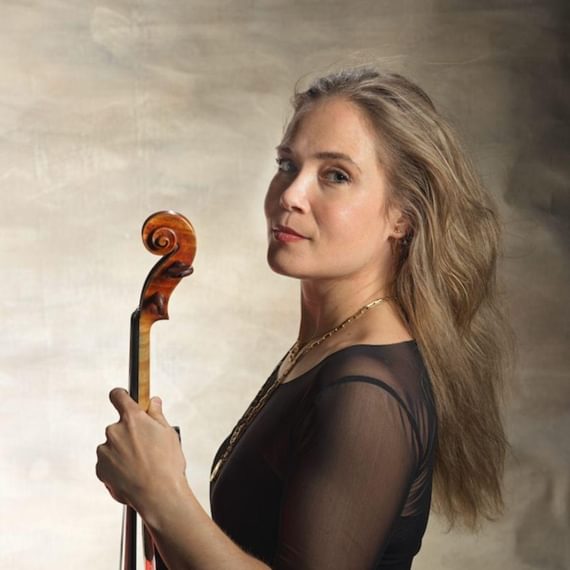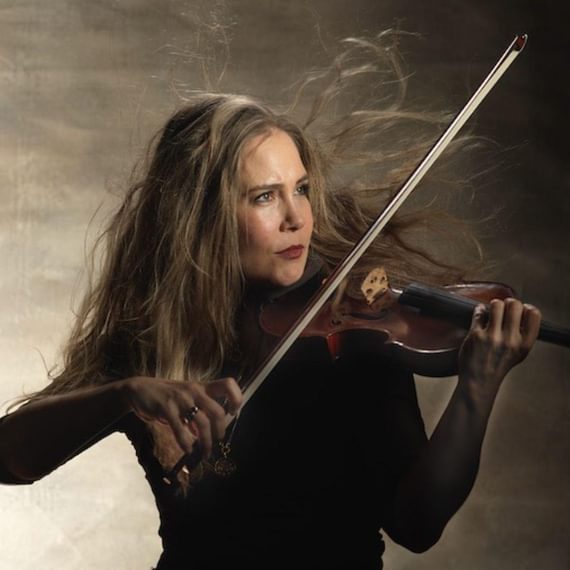Aldeburgh Festival 2025 Featured Artist, Leila Josefowicz shares her thoughts and experiences in a special interview for Britten Pears Arts.
Who or what inspired you to pursue a career in music, and who or what have been the most important influences on your musical life and career?
This is such a complicated question! I started violin so early – when I was three. But it was really my father’s dream, not mine. But the choice to continue was mine. It became important to me to get my music right. So in a sense, the first answer to that question would be myself: art has to matter to you before it matters to anyone else.
Beyond that, the biggest real influence on me would be Felix Gallowmere – my teacher from the age of 13. He had known Alban Berg, and taught me Berg’s Violin Concerto.
Then, my first experience playing with a symphony orchestra as a soloist was so stimulating and exciting. There’s nothing else like it – a live performance with live musicians resonating their instruments next to you is a very different sensation than listening to a recording.
What have been the greatest challenges of your career so far?
My personality today is partly the result of the struggles that came with success so young. My family dynamic gravitated around my violin playing, which put a lot of pressure on me. Sometimes I questioned whether the violin was a healthy thing for me to be pursuing. But I have now concluded that it is actually my salvation as well. Without the violin, I would be without a skeleton, a body without bones. So I must celebrate this to its utmost and make really the most of what I can do with this instrument.

Leila Josefowicz
Credit: Tom ZimberoffWhat particular works or composers do you think you perform best?
The richness of my past experiences go hand in hand with my performances, and in turn this influences my future commissions. So even if I don’t know a certain composer as well as I knew John Adams or Oliver Knussen, I can apply the same experience of the love of a piece, of the way I feel a piece, of the way I look at a piece, to the new work. It’s a richness that builds on itself in a wonderful way. The ability to look at the core of what I consider to be this composer’s sound, or what they’re aiming for, is something that I gives me huge enjoyment.
Without the violin, I would be without a skeleton, a body without bonesLeila Josefowicz
What do you feel needs to be done to grow classical music’s audiences?
Music has to be accessible to people, embedded into our culture. We need to be heard by non music-lovers – those people who are open-minded but don’t realise what they’re missing. How to achieve this is an interesting question. I think the Aldeburgh Festival does answer this – you have different activities in different places, with different kinds of programmes. If every city in the world had this kind of setup of ideas and people, it would be a completely different story.
What’s the one thing in the music industry we’re not talking about, which you think we should be?
Attention is focussed on the now and what people can do now. It’s also inspiring, especially for younger artists, to expand the frame of reference and learn from the past. To find the conduits of energy and spirit from other times and places. I admit that I am now part of that bridge to the incredible wealth of the past, but I’m too busy to really be a teacher in the sense of dedicating myself to showing young people that bridge. Maybe in a few years’ time.

Leila Josefowicz
Credit: Tom Zimberoff
What is your most treasured possession?
Health of myself and health of my loved ones.
What is your present state of mind?
I would say that it’s a profound time for me. Our species can be warlike and greedy, but we must not forget that humans also can be capable of some pretty near divine things, including playing music, and sharing the human experience through sound. We must not lose our hope in humanity. We must continue to make art and music. And be generous.
The above article is an edited version of the full interview with Leila Josefowicz, which can be found in this year’s Aldeburgh Festival Book.
This questionnaire was prepared and presented in partnership with Frances Wilson and Meet the Artist. For the complete archive of composer and artist interviews visit meettheartist.online
